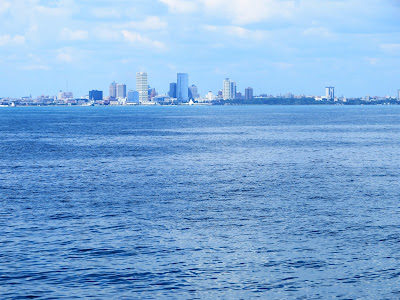I'm alone for the weekend. My wife has gone to meet up with her two sisters. She'll be back on Tuesday night.
According to an ad from Meals on Wheels, "Social isolation is as deadly as smoking up to 15 cigarettes a day." I don't know where they get that information. But I think it's probably true -- for some people, not for others.
I have a sister who was single for about 25 years, between marriages. She lived by herself. But she had a job and several good friends and belonged to a couple of clubs, and so she wasn't socially isolated.
I have a brother-in-law who's been single most of his life -- he had one brief marriage back in the 1990s. I've never known him to have a lot of friends; but he is close to his siblings, and he never hesitates to travel alone. He seems comfortable with the situation.
Myself, I am not an alone person. I don't do well as a single. I just don't like my own company that much.
I've never really lived alone. I grew up in a family of six. Had several roommates in college, and a roommate when I moved to New York City. Then I got married. After we got divorced I did kind of live by myself for a while. But my son was still in high school, and we had joint custody, so he slept at my house three nights a week. And when my daughter was home from college, she often stayed with me.
By the time my son went to college I had developed a relationship with B, my current wife. Technically, I slept home alone most nights, but in fact we were together a lot of the time. I was not lonely. Then we moved into together and eventually got married.
Last December my wife went away for a month to visit her two grandchildren in South Carolina. I was invited. But it was the height of Covid, and I elected not to travel.
So I was home alone for Christmas and New Year's. I set up my own small Christmas tree. I put lights out in front of the house. I forget what I had for Christmas dinner. It was probably a Lean Cuisine from the microwave.
But I didn't feel isolated, because B and I Zoomed or Facetimed pretty much every night while she was gone. I didn't really have much opportunity to sit around and feel sorry for myself.
And that, for me, is the problem about being alone for too long. I start thinking negative thoughts, going over the regrets in my life. Why did I break up with my girlfriend freshman year in college? That was a stupid thing to do! Why didn't I become a lawyer? I could have. I would have made more money -- maybe had a more interesting job, too, you never know. Why did I get married so young? Didn't work out in the end. The divorce was good for me. But what did it do to the kids?
That's why I don't like to spend time alone.
Well, that's not entirely true. Before Covid, I would always go to Florida in the winter -- for a week or two while I was still working, longer after I retired. After I met B, I'd always invite her along, but she only came with me one time. She doesn't like Florida.
So any number of times I was by myself, at least for a little while. It was fun. I could do what I wanted, keep my own schedule. I'd eat junk food, including dessert. Play music that nobody else wanted to hear. Oldies like Simon & Garfunkel, Pink Floyd, the Beatles, even some Doo Wop.
But it never took long for me to start feeling lonely. I once went to Disney World by myself. I felt kind of stupid. Many times I sat by myself in a restaurant, amid a crowd of people, and felt socially isolated.
Fortunately, I now know this about myself. So when I go to Florida I make arrangements to meet up for a day or two with my sister who lives in Jacksonville. And after my Florida sojourn, I reconnect with my wife and family in Charleston, SC. We settle down into our rental near the kids and grandkids, and suddenly I'm surrounded by loved ones -- and my alone time is over. Social isolation, no more.
B and I are going to Charleston again this winter. We feel Covid is now less of a threat. But because of Covid, I am not taking my extra trip to Florida. That's okay. I've got these next three days to myself. I can do it.



















































